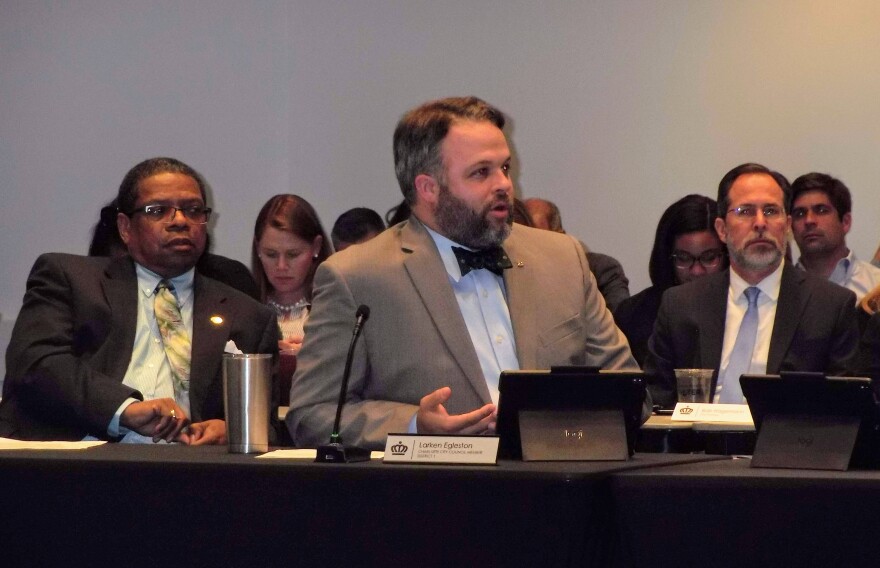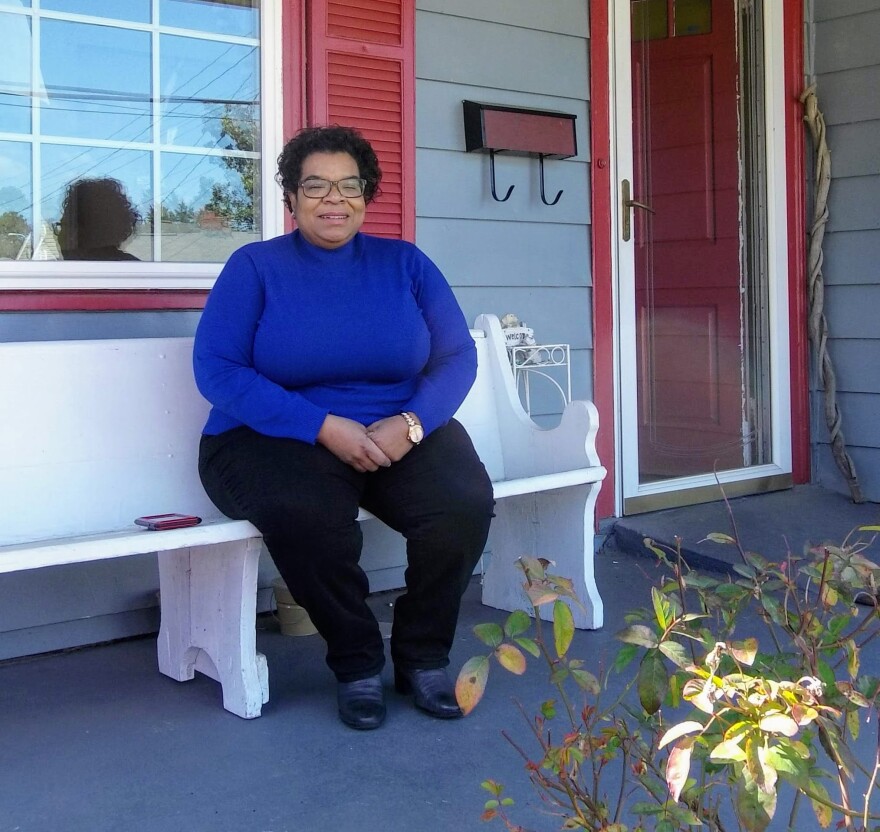Charlotte's North End is a collection of new and old neighborhoods just north of uptown with about 9,000 residents. It's seeing a flood of new investment driven by its proximity to uptown and the buzz around the redevelopment of a massive factory complex off Statesville Avenue.

Camp North End is the name of the 75-acre development that includes a giant factory that once turned out Ford Model Ts and, later, Hercules missiles for the Army. Drugstore chain Rite-Aid used it as a regional distribution center until three years ago. Now, New York developer ATCO is reviving the entire site as a creative- and tech-focused office park. Damon Hemmerdinger is leading the project.
“This will be 704 Games' office,” he said while leading a tour. “They design and create NASCAR's video games, among others. They're moving out of one of the Class A towers uptown to be here.”
ATCO is renovating several old factory buildings in the first major phase of the redevelopment. Since the project began in 2017, new tenants include Ally Bank's tech innovation center, Hygge co-working space and BLKTECH Charlotte, which supports minority entrepreneurs. Youth business education group Junior Achievement is here, as well as arts groups and galleries. There's a coffee roaster and a hair salon, and the "Boileryard" has become a community gathering place on weekends, with food trucks and entertainment.

Hemmerdinger said Camp North End is becoming the catalyst envisioned in city studies that “identified this site as the key to unlocking this area of town because it was behind razor wire and a big impediment to access through and between the community.”
Hemmerdinger said about 200 people here now, and that number will keep growing as it's built out over the next decade.
Neighbors, other investors and entrepreneurs are feeling it. Seventy-one-year-old Pop Sadler grew up in the Greenville neighborhood, just outside the I-277 loop around uptown.
“We have arrived,” Sadler said. He moved away after the neighborhood was torn down in the 1960s, but moved back in 1980. He said he’s both proud and concerned about the development around him.
“The North End is getting ready to explode," he said. "I mean, because there's no other direction for Charlotte Center City to go. And right now, we're ready. We're seeing some little things happen, but we're looking forward to the big things that are going to take place."
[Related Content: Finding Home: Finding Home: Hope Is In The Air As Kannapolis Rebuilds Its Downtown]
By that, Sadler means the area may finally get more shops and restaurants — and maybe even a long-sought grocery store. Houses in North End's neighborhoods are still relatively inexpensive, something fast disappearing around Charlotte. But that is changing, as investors badger homeowners to sell, said Sadler.
“We get postcards, letters... now we're even getting phone calls on the cell phone and house phone — I don't know how they do that — wanting to make you an offer,” he said.

Sadler runs the Greenville Neighborhood Association and said he's afraid investors are taking advantage of some neighbors. He said he's worried about how all that buying and selling will affect home values — and property taxes.
“That's why we've become afraid of gentrification," Sadler said. "Because when they resell it, and the taxes continue to go up, some people just won't be able to afford the higher tax, so they'll move out, and they’ll be forced out."
Natural Affordable Housing
North End neighborhoods saw some of the biggest gains in the recent Mecklenburg County property revaluation — with values doubling or even tripling in places like Druid Hills. The city and county haven't set new tax rates yet, but even if they lower the rate to hold revenue steady, some residents still could pay more.
The fact is, the North End real estate market is hot, and not just because of Camp North End. A decade ago, city officials razed the run down Double Oaks housing project along Statesville Avenue. It's now Brightwalk, a mixed-income development of apartments, townhouses and single-family homes. Some of those single-family homes are now selling for more than $400,000.

City council member Larken Egleston represents part of the area. He said there's a combination of excitement and anxiety about all the new investment.
“We as a city just need to make sure that the folks who have been the anchors and the foundation of those neighborhoods for so long are not forced to leave those neighborhoods," Egleston said. "[We need to make sure] that they're able to stay there and reap the benefits of that growth and investment."
There is something slightly different about this neighborhood as it gentrifies: A keen awareness of the threat, among city officials, residents and newcomers.
The North End is one of the most important areas for what city officials call "naturally occurring affordable housing" — older homes that sell or rent for lower prices than the city average. One city program helps seniors with rising property taxes. And last fall, the city council approved the $3 million purchase of the old Double Oaks school as a future affordable housing site.

Camp North End has also cultivated a lively arts scene, both through events at the Boileryard and by leasing 20,000 square feet rent-free to the Goodyear Arts collective. Matt Cosper is artistic director of XOXO, a theater group in the complex. He said his group probably wouldn't exist without the arrangement. He also noted that Camp North End has brought in residents from the surrounding neighborhoods.
“There has been a real effort to include the local community in what's happening here," he said. "To be absolutely frank, I see black and brown faces around. And that's really cool."
He said he hopes it will stay that way. But he said he worries that his group's success could signal gentrification to come.
“Artists are complicit in it. Like it or not, I think artists find new spaces because we typically can't afford space, so we go where cheap space is available," Cosper said. "And we are the heralds of doom. When artists show up in a community they know that displacement is coming after."
Just look at the North Davidson Street area, said Cosper. NoDa had a thriving arts scene 20 years ago. Now, new construction has transformed the neighborhood. And at least part of its former arts scene has shifted to the North End.
City Efforts
To help, the city has tried to work with neighborhoods through an initiative called the North End Smart District. It piloted a farmers market at Camp North End that now has evolved into a weekly free produce truck that goes street to street. Other programs have targeted energy use and technology education. Residents also have been invited to help plan improvements through what the city calls a "kickstart" process.

And for the past two years, Camp North End has held regular meetings and events for neighbors. They even have the use of a computer center and meeting space called The Nest.
Meanwhile, the area's neighborhoods have joined forces. Melissa Gaston of the Druid Hills neighborhood, just north of Camp North End, leads the newly formed North End Community Coalition.
“The North End Community Coalition is a group of eight neighborhoods where all the leaders got together, from Graham Heights, the Park at Oaklawn, Druid Hills, Greenville, Genesis Park, J.T. Williams and Brightwalk at Historic Double Oaks,” she said.
[Related Content: Finding Home: The Fight To Save Smithville]
The group had its first meeting last month. They work with public officials, investors and residents on issues like crime, or the really big one — gentrification, Gaston said.
“We see it happening and we see people who are coming in and taking advantage of the residents in the community," she said. "So we got together and said OK, what can we do?”
That includes workshops to help people understand gentrification and protect themselves from being taken advantage of.

Business Changes, Too
It's still early, but all the interest in the North End is beginning to attract new businesses. Kurt Hogan owns Heist Brewery, which just a couple of weeks ago opened its new brewery and taproom in an old junkyard across Woodward Street from Camp North end.
“I think it's going to really start blowing up pretty soon," Hogan said. "I don't know personally, but I hear a lot of things from my real estate broker like what's going, where [and] who's interested.".
He said he sees all kinds of preparatory work is going on at sites around the North End that signals coming development.
Over at the Fatou Market on Statesville Avenue, they see change coming too. The manager is Mr. P, a transplant from Mali in West Africa. (He didn't want to give his full name.)
“I love the community. That's why me and my partner have got a store, and we tryin' to stick around as long as we can,” he said.
“And next door, they're about to open a restaurant now, long time. And next one next to it, that's a car wash. And we have a barbershop in the back and we have school behind," Mr. P continued. "You know, it's a lot of stuff here. So many churches and stuff, you know. Hopefully I hopes, you know, this place would be better for all of us.”

Gentrification does also affect businesses. Just two weeks ago, a group of mostly black-owned small businesses and nonprofits found out they're being kicked out of their older office building on North Tryon Street in the Lockwood neighborhood. One of those affected asks: Where will we go?
_
WFAE is taking a year-long look at Charlotte's affordable housing problem through our series, Finding Home. Every Monday in 2019, we’ll have stories that examine the problem, seek solutions, and bring you stories from neighborhoods small and large, both in and outside Charlotte. Don't miss a segment. Sign up for the Best of WFAE weekly newsletter to get the latest Finding Home along with the other most important news of the week.












